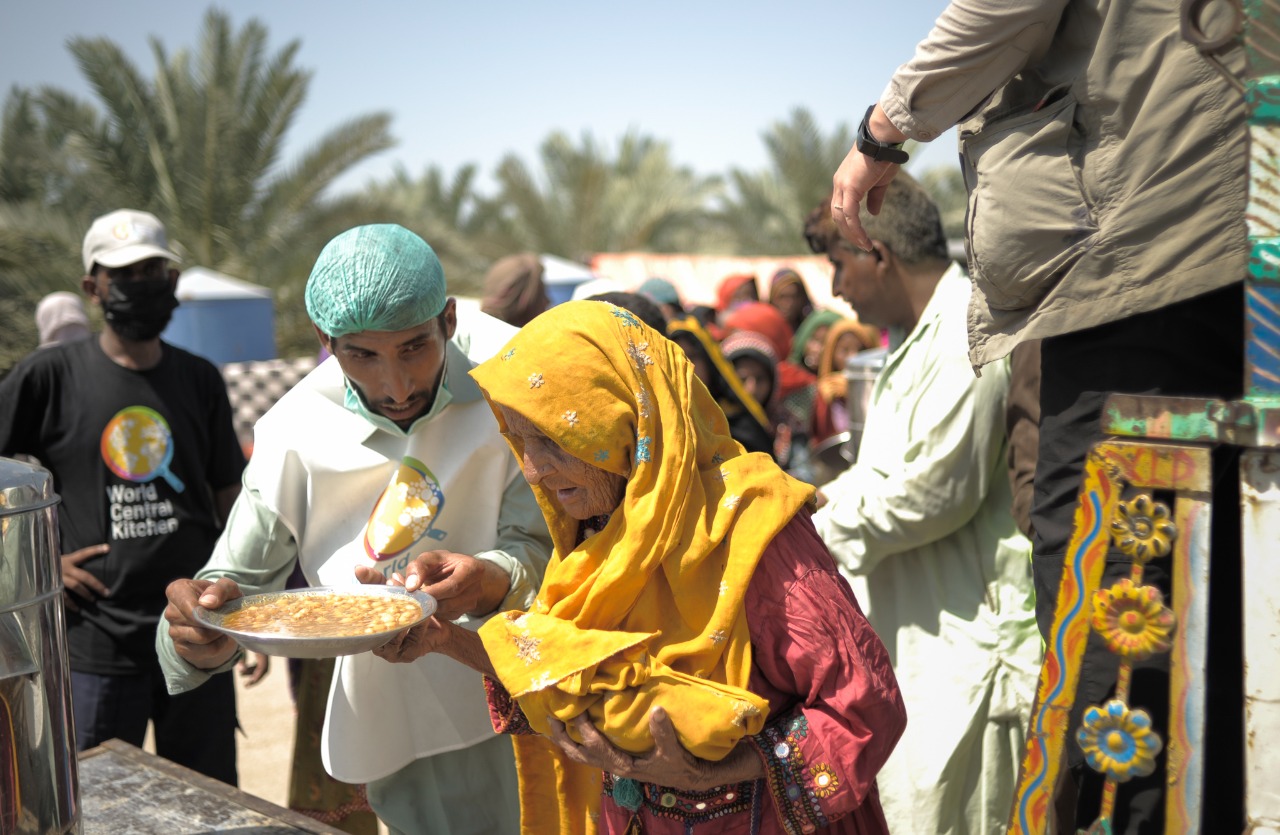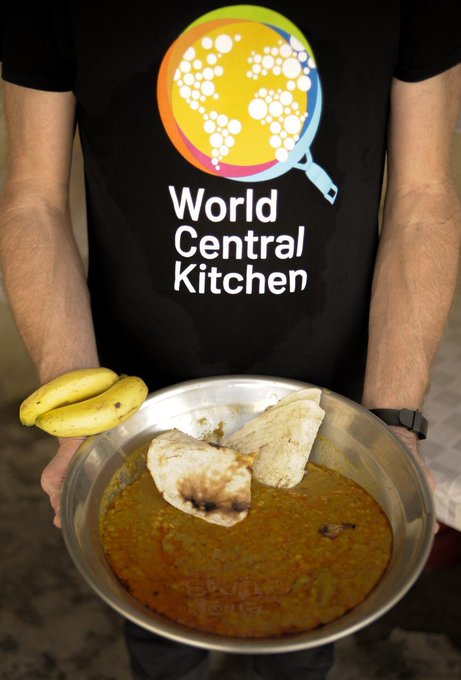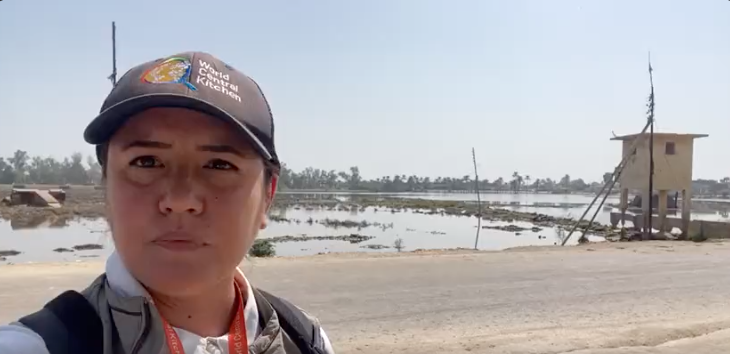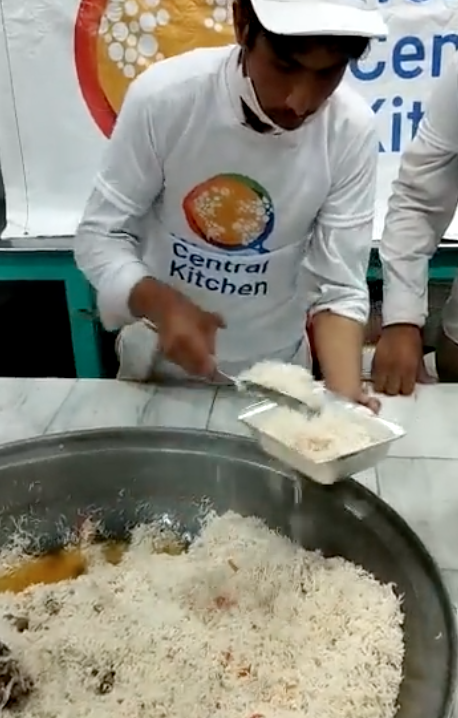Second Relief Kitchen opens to support flooded villages in Sindh, Pakistan

Record monsoon rains and melting glaciers in Pakistan’s northern mountain regions unleashed unprecedented flooding that submerged a third of the country. These are the worst rain and flooding in Pakistan’s history and according to experts, the climate crisis may have increased the intensity of rainfall by up to 50%. The damage left behind is unimaginable. Local communities and aid groups who have been on the ground say the situation is beyond what they have ever seen.
To give some context, flooding has impacted 33 million people with as many as seven million being directly displaced. There is no access to clean water and entire villages have been cut off from critical services. Agriculture plays a key role in Pakistan’s economy and with an already present economic crisis, the extensive damage has affected at least two million acres of land leaving families without food and a means of living. The devastation is estimated to cost $30 billion dollars.
But the real disaster is what comes after the floods. Around 1,600 people have lost their lives—nearly a third of whom are children. Now, the area has become plagued by diarrhea, dysentery, dengue fever, and malaria, and many people who survived the flooding are now dying at increasingly rapid rates of disease, stemming from the lingering effects of the floods. And although floodwaters have begun to recede, Pakistani officials warn the entire process may take three to six months. Still, flooded fields may not be ready for cultivation by then.
To immediately begin supporting people in need, WCK partnered with Instant Aid—a local NGO who has also worked with us in Ukraine and Afghanistan—to distribute fresh meals and water in the northwestern Khyber Pakhtunkhwa province. We then established a Relief Kitchen in the Swat District where we have been cooking thousands of daily meals for almost a month now.
We’re serving familiar dishes like beef qorma and chalaw with rice or naan, and fresh fruit to families living in camps and to patients receiving care at clinics. Our Relief Team hand delivers food—at times requiring us to wait until small streams are safe enough to cross so we may reach people on the other side.
WCK staff are now also on the ground supporting local partners to increase meal capacity and expand our reach to serve more communities in need.
Last week, we began cooking out of a second kitchen in the hard-hit Sindh province in southeastern Pakistan. Our regional partner Rizq—a local food relief group that has been serving flood damaged areas around the country—has been instrumental in getting our Sindh operations running.
Comforting dishes are being prepared utilizing local techniques like tarka—a method of tempering spices in oil to bring out flavor and texture—and cooking with a daig—or a large cauldron-like pot—to scale up, transport meals, and keep them hot.
To meet rising needs, WCK cooks begin kitchen prep before sunrise. It hovers around 100 degrees every day with very little shade available, but still, the team works with care and compassion to provide a dignified meal service.

Gul, Mohammad, and Shahid, pictured above, work for well-known Pakistani restaurant Monal – but since the floods began they put their regular jobs on hold to cook with Rizq. The team started in the state of Punjab and has been gradually moving south cooking for disaster-stricken areas. Now in our Sindh kitchen in Khairpur, the Rizq team is cooking and delivering nourishing meals with WCK.
Utilizing trucks, we are traversing water-logged roads to reach villages where people are unable to return home and are in critical need of food. Conditions after the floods have brought many health dangers so our team is ensuring we distribute meals in a safe manner and are providing clean drinking water.
Since households in Sindh were able to salvage some kitchenware, we are serving directly out of daigs onto peoples’ plates and pouring drinking water from refillable bottles into individual water containers, helping to keep our efforts more sustainable.

Women play a vital role in helping us get meals out to families in Sindh. In addition to plating food and assisting WCK in identifying needs, some women have organized themselves as the head of their households and are responsible for picking up large portions of food to take back to their families.
In Nau Goth, a young woman, pictured above, is served delicious channay—a chickpea gravy—that will provide for all the members of her household. This dish, rich in iron and vitamins, is a meal right out of the Pakistani household staples!
Razzaq and his family, pictured left above, enjoy their WCK meal in a shelter they made on a dirt roadside near their village in Goth Sohrab Katore. “There is still around three feet of water in our village and we have lost most of our animals,” explains Razzaq.
In the village of Ali Sher Kashmir, Haseena, pictured above to the right, and her seven kids come to have lunch in a dry mango orchard. Her home is still flooded so she’s unable to return. She and millions of other families across Pakistan have been displaced for over a month now.

In the span of several weeks, WCK has served 51,000 meals across 25 recipient locations. The situation is dire and WCK is one of the only international NGOs on the ground. While we understand the country has a long road to recovery which will require various forms of support, our team continues to adapt to the situation and work tirelessly to support more impacted communities with immediate food relief.
To keep up with our #ChefsForPakistan response, follow WCK on Twitter, Instagram, and Facebook.































